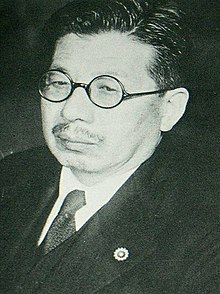Katayama Tetsu
Katayama Tetsu ( Japanese 片 山 哲 ; born July 28, 1887 in Tanabe , Wakayama Prefecture , † May 30, 1978 in Fujisawa , Kanagawa Prefecture ) was a socialist Japanese politician and from 1947 to 1948 the Prime Minister of Japan .
Life
Katayama studied law (German law) at the Imperial University of Tokyo until 1912 and worked as a lawyer from 1913. He was a Christian and was inclined to Christian socialist ideas. In 1926 he participated in the founding of the "Socialist People's Party" ( 社会 民衆 党 , shakai-minshū-tō ) and became its general secretary. In 1930 he was first elected to Shūgiin in the 2nd constituency of Kanagawa . In 1932 he became a member of the executive committee of the "Socialist Mass Party" ( 社会 大衆 党 , shakai-taishū-tō ), which was created through the merger of several socialist parties. In March 1940 he was expelled from the party when he did not participate in the parliamentary debate on the expulsion of Saitō Takao , who had questioned the legitimacy of the war against China in a speech. After the war, Katayama took part in the founding of the Socialist Party of Japan (SPJ) in 1945 , was initially its general secretary and in September 1946 became chairman of the Central Committee. After the Shūgiin election in 1947 , the first under the new constitution , the SPJ was the strongest force. Prime Minister Yoshida Shigeru was not available for re-election and the Shūgiin elected Katayama on May 23, 1947 with 420 votes in the Shūgiin unopposed as Prime Minister.
Katayama formed a coalition government with the Democratic Party and the Kokumin-kyōdō-tō ( 国民 協同 党 , "People's Cooperation Party "). As a moderate socialist politician, his inauguration was also welcomed by the occupation authorities ( Supreme Commander for the Allied Powers , abbreviated to “SCAP”), which initially supported his domestic political reforms. During his reign he pushed through, among other things, the dissolution of the Ministry of the Interior and the Ministry of Justice. However, his collaboration with bourgeois parties and the attempt to consolidate the state budget through price and tax increases soon brought him into conflict with left-wing SPJ politicians such as Suzuki Mosaburō , which led to the resignation of his government in February 1948.
During the split in the SPJ in the early 1950s, Katayama belonged to the right wing, in 1960 he took part in the founding of the Democratic Socialist Party , of which he was a member until 1964. After losing his seat in 1963, he retired from politics.
Katayama was also the founder and chairman of the National Federation for the Defense of the Constitution in 1954. He also held other board positions in various associations. These included the League of the World Federation of Christians , the Association for the Study of Chinese Culture, and the League for Political Cleansing and Publicly Controlled Elections .
literature
- Renate Ruttkowski in: Biographies for World History , Lexicon, VEB Deutscher Verlag der Wissenschaften, Berlin 1989, p. 286
See also
Individual evidence
- ↑ https://content.time.com/time/magazine/article/0,9171,948194,00.html
- ^ TIME, February 23, 1948: New Road
Web links
- National Parliamentary Library : Historical Figures (English)
| personal data | |
|---|---|
| SURNAME | Katayama Tetsu |
| ALTERNATIVE NAMES | 片 山 哲 (Japanese) |
| BRIEF DESCRIPTION | Japanese Prime Minister |
| DATE OF BIRTH | July 28, 1887 |
| PLACE OF BIRTH | Tanabe (Wakayama) , Wakayama Prefecture , Japan |
| DATE OF DEATH | May 30, 1978 |
| Place of death | Fujisawa (Kanagawa) , Kanagawa Prefecture , Japan |
